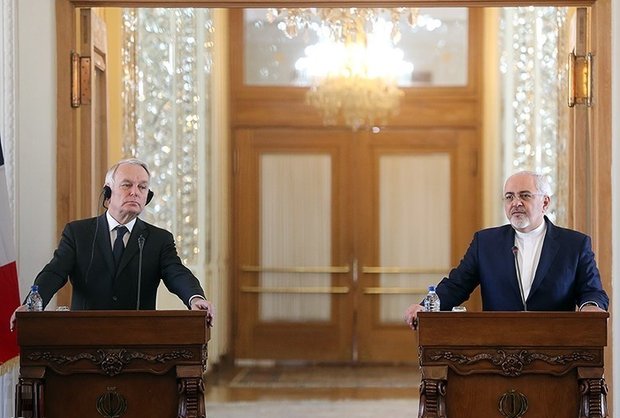During a joint meeting with his French counterpart Jean-Marc Ayrault on Tuesday morning in Tehran, Foreign Minister of Iran Mohammad Javad Zarif welcomed the French delegation who landed in Iran on a historical day; “38 years ago this time, Imam Khomeini, who had been a guest to the French people, returned home and marked inception of the Islamic Revolution.”
He commemorated memory of Imam, martyrs as well as the friendship between Tehran and Paris; “it remains an honor for me to attend a session with Iranian and French entrepreneurs.”
Zarif later praised the positive and forward-looking attitudes held by Head of Iran Chamber of Commerce, Industries, Mines and Agriculture (ICCIMA) Gholamhossein Shafei and the French FM Ayrault reassuring that Iran holds similar views on expansion of multilateral ties with France in various economic, cultural, scientific and technological fields in addition to political areas, regional cooperation as well as the fight against terrorism.
He recalled that the first session of Joint Economic Commission, as an outcome of President Rouhani’s earlier visit to Paris, will be held on Tuesday afternoon; “the event, above all, indicates firm political determination of the two sides for elevation of bilateral relations especially in economic areas.”
Mohammad Javad Zarif said eye-catching developments were made in economic ties of the two countries as the volume of trade turnover between Iran and France experienced rise by three times following implementation of the Joint Comprehensive Plan of Action (JCPOA) and climbed to over 1.7 billion euros.
He reiterated that Tehran and Paris held necessary potentials to further boost the figure expressing hope that post-JCPOA capacities would provide new opportunities for reinvigoration of bilateral ties..
“Iranian and French economic activists are able to deepen existing ties thanks to the present security in Iran,” he continued.
The official noted that foreign ministries of both sides were obliged to pave the path for stronger ties by providing necessary political and economic grounds.
Mohammad Javad Zarif went on to add that entrepreneurs, traders, businessmen, industrialists and private sector officials were to shoulder the main responsibility in strengthening mutual cooperation.
Iran’s FM emphasized that the process of economic cooperation with foreign countries was faced with numerous challenges especially in view of political developments in the US and Europe; “nevertheless, Iran, as a reliable and stable partner, is willing to conduct long-term economic cooperation based on mutual interest with European countries especially France given the age-old history of ties between the two states.
He underlined that the Islamic Republic of Iran would support economic activists of the private sector given their significant and key position; “eccentric and endogenous economy marks the main axis of economic development in the Islamic Republic for decades to come.”
Later into his remarks, FM Zarif enumerated numerous advantages of Iran for economic cooperation the most important of which being its unparalleled security resulting from people’s trust and their active participation in political, economic and technological arenas.
“Extremists in the region have failed in their efforts to disturb Iran’s security as well as that scientific and economic dynamicity of Iran has been immunized against possible external pressures.”
He said other noteworthy features included rich natural resources, geographic position, transit capabilities, well-educated young population, significant scientific progress, rapid national development as well as market’s ability in management of economic crises.
He voiced satisfaction that, along with France, Iran had taken first steps towards production aimed at exports to global markets; “hopefully, joint productions of Iran and France will soon be released to domestic and international markets.”
Iran’s foreign minister recalled that rate of inflation was reduced from over 42% to lower than 9% as well as that economic growth rate of about 7.4 per cent was promising to bright prospects for the country’s economy.
The official underscored that majority of achievements were obtained during cruel sanction years which indicated reliability of Iran’s economy given the country’s trust in people for security, development and progress.
“Within framework of the Sixth National Development Plan, our priorities include oil and gas, petrochemical, transportation and transit, science and technology, knowledge-based industry, mining industry, water resource development as well as environment among the others.”
The official said these areas offered proper capacities for development of cooperation with other countries especially France who has a good presence in Iran; “the Ministry of Foreign Affairs, as the Iranian head of the Joint Economic Commission, will support economic transactions while joint chamber of commerce between the two countries need to become strengthened.”
He urged the need to pay due attention to small and medium projects along with huge ones adding “the Ministry will spare no effort in providing proper grounds for development of international relations with various countries.”
“JCPOA offers excellent opportunities as it has eliminated majority of barriers to economic ties between Tehran and Paris,” said Zarif.
He noted that although unnecessary precautions exercised by some major European banks has posed limitation to complete exploitation of capacities, efforts of the French government, as an important partner of Iran, will guarantee activities of these credible banks so that further expansion of ties will be observed.
HA/IRN82409584

























Your Comment